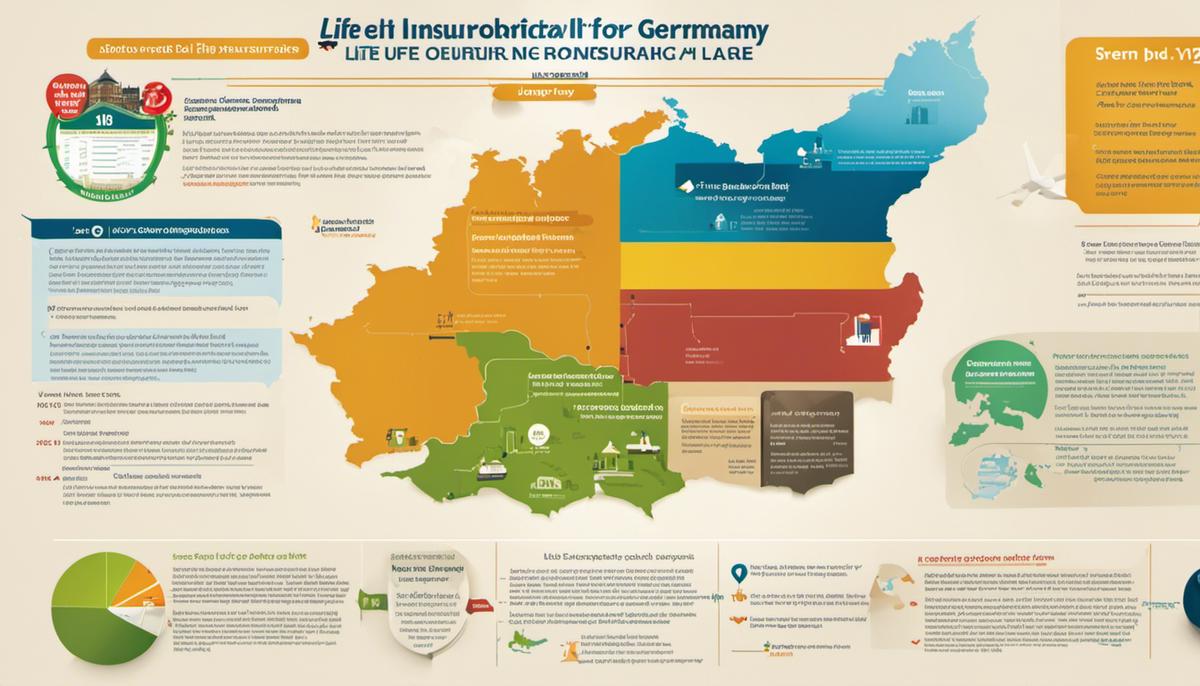Understanding the importance, intricacies, and process of obtaining life insurance is essential for an individual’s financial well-being, especially given the diverse nature of insurance offerings in different countries.
This comprehensive exploration delves into the significance and scope of life insurance in Germany from various perspectives – shedding light on its impact on individuals and the wider economy, encapsulating the types of available policies, explaining the purchasing process, and providing nuanced data on contract terms and conditions.
With a specific commentary on the role of top life insurance providers, this text further guides you in making informed decisions that fit your personal and financial circumstances.
Table of Contents
ToggleThe Importance of Life Insurance in Germany
German Population’s Perception of Life Insurance
Life insurance is widely recognized among the German population as a vital financial planning decision. This perceptiveness arises from the understanding of death’s unpredictability and the financial consequences it may pose for the surviving dependents.
Life insurance policies are perceived as a protective measure for their families, offering them monetary support in case the policyholder unexpectedly passes away. In addition, it can act as a means of investment that also provides tax advantages, making it an attractive financial product for many Germans.
Reasons for Germans to Invest in Life Insurance
There are several reasons why Germans buy life insurance. Foremost among them is the desire to secure their family’s financial future. Life insurance payouts are typically used to cover ongoing living expenses, allowing a family to maintain its standard of living even in the absence of the policyholder’s income.
In addition, the funds may also be used to pay back outstanding debt, preventing the family from inheriting any outstanding liabilities. For some, purchasing life insurance also factors into their retirement income planning. With Lebensversicherung, a common type of life insurance in Germany, policyholders can stipulate that they receive the accumulated funds should they survive the contract term, supplementing their retirement income.
Impact of the Life Insurance Sector in Germany’s Economy
Life insurance is a major pillar of Germany’s insurance industry. In 2019, it made up 36.4% of the industry’s premium earnings, amounting to about 92 billion euros. As a result, the life insurance sector has a significant impact on Germany’s economy.
It contributes to financial stability by absorbing risks that other financial institutions would find difficult to manage, such as longevity risk and mortality risk. Moreover, life insurers hold extensive investment portfolios, which allow them to provide stable, long-term financing for the broader economy. They also play a critical role in mobilizing domestic savings and allocating them to productive purposes.
Changes and Challenges in Life Insurance Sector
Despite its significant role in the economy, the life insurance sector in Germany is not without challenges. Issues like low interest rates have put pressure on insurers’ profitability. Additionally, a wave of regulatory changes, such as the implementation of Solvency II – a directive in European Union law that codifies and harmonizes EU insurance regulation, has also impacted the sector. Companies are now placing a greater focus on product innovation and customer centricity to stay competitive in a rapidly evolving market landscape.
Life Insurance in Germany
Life insurance in Germany plays a key role, functioning as a protective shield for families, a means for retirement planning, and a vital element in the nationwide financial sector. Despite facing periodic challenges, the vital role life insurance assumes for the typical German citizen and its overall effect on economic health denotes that it will persist as an inextricable component of Germany’s financial structure in times to come.

Types of Life Insurance in Germany
Understanding Term Life Insurance in Germany
Termed as “Risikolebensversicherung” in German, term life insurance is one of the most uncomplicated types of life insurance obtainable in Germany. This form of coverage assures financial stability for the policyholder’s dependents, should the policyholder unfortunately pass away within the stipulated insurance term. Beneficiaries usually receive a lump sum, which can aid in settling debts, catering to daily living costs, or contributing towards education-related expenses.
The primary leverage of term life insurance lies in its reasonably priced premiums, which are much lower comparatively to other forms of life insurance. However, it comes with a noteworthy restriction that, should the policyholder outlive the duration of the policy, no benefits are payable and all paid premiums are non-refundable. This policy suits those who have young families, people with mortgages, or those engaged in high-risk professions.
Endowment Life Insurance in Germany
Endowment life insurance or “Kapitallebensversicherung” combines both insurance and savings elements. Unlike term life insurance, which has no investment component, endowment insurance combines a death benefit with a savings plan. If the policyholder survives the policy term, they receive a lump sum payout, which often includes a guaranteed payout plus bonus interest.
The primary benefit of endowment life insurance is the guaranteed savings benefit, which could potentially yield a significant lump sum at the end of the policy term. However, the returns on endowment policies are generally lower compared to standalone investments. Endowment life insurance policies are typically more expensive when compared to term life insurance. These policies are best for individuals who want both life cover and a forced savings mechanism.
Whole Life Insurance in Germany
Whole life insurance, or “Erlebensversicherung” in Germany, offers life coverage for the policyholder’s entire lifetime. This type of life insurance policy promises a guaranteed payout upon the policyholder’s death, whenever that may be.
One major advantage of whole life insurance is that it includes a savings component, allowing policyholders to accumulate cash value over time. Policyholders can often borrow against this cash value or allow it to accumulate as an investment. On the downside, whole life insurance is typically the most expensive type of life insurance because it provides lifelong coverage and has an investment element. This policy is ideal for policyholders seeking lifelong coverage, those looking to create an inheritance for their heirs, or those seeking to accumulate a tax-advantaged cash value.
To ensure the financial security of one’s family, create wealth, and secure a stable future, it’s critical to understand the intricacies of life insurance policies in Germany. Knowledge of the unique characteristics, benefits, and restrictions of these insurance plans plays a key role in making the most effective decisions.

The Process of Buying Life Insurance in Germany
Eligibility for Life Insurance Policies in Germany
Generally, one needs to be at least 18 years old to be considered eligible for a life insurance policy in Germany. However, there are exceptions where insurance agencies might agree to cover minors, granted that they have the permission of their lawful guardians. Typically, the age limit for initiating such a policy lies between 65 and 75. Additionally, German law mandates insurance providers to take into account an applicant’s health condition and lifestyle risks. These factors have a significant impact on the provisions and premiums of the policy.
The Process of Risk Assessment
Risk assessment is a crucial part of the life insurance application process in Germany. This involves evaluating the risk associated with the life insured to determine the appropriate premium or whether to offer coverage at all.
Insurance companies accomplish this through a series of detailed questions about the individual’s personal health and family medical history, lifestyle, occupation, and possibly their hobbies (specifically, those considered to be high-risk). These criteria are often used to classify risks into categories, which then dictate policy terms and premium sets.
The Role of Health Checks in Life Insurance Process
Health checks, or medical examinations, are sometimes required when applying for life insurance in Germany. This is particularly common for higher coverage amounts or if potential health concerns have been identified in the risk assessment process. The health check can involve blood tests, electrocardiograms, and additional physical examinations. Insurers may also request medical records from an individual’s doctor, with the individual’s permission.
Policy Premiums and Calculation Process
In Germany, life insurance premiums are calculated based on several factors. These primarily include the individual’s age, gender, health status, occupation, lifestyle choices, and the amount of coverage required. The younger and healthier a person is, the lower their premium.
Conversely, older individuals or those with serious health issues may face higher premiums. An important aspect within the premium calculation process is the risk factors assigned to each category designed to quantify the likelihood of a claim being made.
Required Documents for Life Insurance in Germany
Purchasing life insurance in Germany necessitates certain documentation, which includes proof of identity and residency such as a passport or ID card and, for non-citizens, a residence permit. In order to determine the applicant’s financial stability, financial information such as earnings records or tax returns is required.
Detailed medical history is also important, especially regarding serious prior illnesses. To round off the application, a signed health declaration confirming the truthfulness of the information provided about the applicant’s health is demanded, offering insurers protection against fraudulent claims.
Accuracy in providing this information is paramount to prevent future disputes over policies or claim denials. Providing false information could result in policy cancellation or even criminal charges for fraud. Hence, honesty is crucial throughout the process.

Understanding Life Insurance Terms and Conditions in Germany
Understanding Life Insurance in Germany
In Germany, life insurance or Lebensversicherung, is designed to provide financial security for your dear ones upon your passing. The primary objective of this insurance policy is to ease financial burdens that could emerge in the wake of losing a family member who earned income.
There are two prominent types of life insurance within Germany – term life insurance, or Risikolebensversicherung, and endowment life insurance, or Kapitallebensversicherung. Term life insurance offers coverage for a predetermined period, whereas endowment life insurance couples insurance coverage with a savings plan.
Key Terms in German Life Insurance Contracts
Several common terms in German life insurance contracts include Beitragszahler (policyholder), Versicherter (insured), Versicherungssumme (insurance amount), and Vertragslaufzeit (contract term). Two valuable terms to understand are “Risikoversicherung”, which refers to insurance that only pays out if the insured person dies, and “Erlebensfall”, a payout made if the insured person survives the term.
Policyholder Rights and Responsibilities
As a policyholder, one has the right to choose the beneficiary (Bezugsberechtigter) who will receive the payout upon their death. They’re also entitled to receive information about their policy from their insurer, including premium rates, coverage, and terms and conditions. Policyholders are obliged to pay their premiums on time, notify the insurer about any change in their health status or personal circumstances, and provide accurate and complete information when applying for the policy.
Typical Exclusions in German Life Insurance Policies
German life insurance contracts often exclude some events from coverage. These exclusions may include suicide within the first two years of the policy, intentional self-inflicted injuries, or death due to war or civil unrest. It’s crucial to read your policy carefully to understand its exclusions fully.
Understanding the Fine Print
German life insurance contracts can contain complex language and terms. Key points to watch out for include the surrender value (Rückkaufswert), relating to how much money you’ll get if you cancel your policy, the waiting period (Wartezeit) before your policy takes effect, and the policy’s overall cost, including fees and charges.
Understanding Life Insurance Regulation in Germany
In Germany, the Federal Financial Supervisory Authority (BaFin) oversees life insurance. Their primary responsibility is to ensure the stability and integrity of the insurance sector. By setting the necessary regulations, BaFin makes sure insurance firms are financially competent and their policies are comprehensible, equitable, and transparent. Additionally, BaFin provides an avenue for policyholders with grievances regarding their insurers.

Reviewing and Choosing a Life Insurance Provider in Germany
A Closer Look at Germany’s Top Life Insurance Providers
The insurance landscape in Germany is quite extensive, with numerous providers offering diverse life insurance coverage options to suit various needs and situations. Prominent among these firms are Allianz, AXA, ERGO, and R+V.
Allianz, a global insurance behemoth known for its quality coverage solutions, offers both term and permanent life insurance plans that are modifiable to meet individual requirements.
AXA, another key player, is recognized not only for its broad array of insurance products but also for its outstanding customer service. It provides a spectrum of life insurance policies, such as risk and annuity insurance, aiming at different aspects of financial protection.
ERGO, a Munich Re Group’s arm, boasts a widespread presence in Germany and a range of insurance options, including term life and guaranteed acceptance life insurance. Noted for their flexible coverage and consumer-friendly paradigm, their offerings appeal to a broad customer base.
R+V presents an expansive suite of insurance services to its clients. It has a range of life insurance products in their portfolio, including pensions, term life insurance, and burial insurance. R+V’s reputation for reliable services and high customer satisfaction underpins their success in the industry.
Considerations When Selecting a Life Insurance Provider
Choosing the right life insurance provider in Germany requires careful considerations that extend beyond merely looking at premium costs. Factors like reputation, financial stability, customer service, and product offerings should also be considered.
Reputation is crucial when selecting a provider. Do some research to find out what current and past customers have to say about the company. Check independent reviews and ratings to gauge the company’s reliability and track record in terms of claims handling and reimbursement.
Financial stability of the insurance provider should be another critical consideration. Assess the insurer’s financial strength ratings from global credit rating agencies like Standard and Poor’s, Moody’s, and Fitch. Companies with stable financial ratings are more likely to fulfill their policy obligations.
Customer service is also an essential factor. Seamless, efficient processes and responsive, helpful customer support can make a significant difference in your insurance experience. The provider should be there to support you, not only during the policy’s purchase but also throughout its lifespan.
In terms of product offerings, the best insurer should have diverse policy options that align with your individual needs and financial circumstances. For example, younger individuals may consider term life insurance, while those closer to retirement might prefer annuity insurance. Be sure to understand the nuances, pros, and cons of each insurance product before deciding.
Comparing Providers
To make an informed decision, take time to compare different insurers and the policies they offer. Several online resources and comparison tools can help streamline this process. Comparisons should focus on the policy benefits, exclusions, premiums, payment flexibility, and insurer ratings.
Also, consider seeking advice from independent financial advisors who are familiar with the German insurance market. They can provide tailored advice that suits your personal needs and financial plans.
Ultimately, there’s no one-size-fits-all when choosing a life insurance provider in Germany. It requires careful planning, research, and financial wisdom. The best plan is the one that fits your personal circumstances, financial capability, and long-term objectives.

The realm of life insurance in Germany is diverse, complex, and critical. It provides not just financial security but also contributes significantly to the national economy. By understanding the diverse insurance types, you have the freedom to choose a suitable policy tailored to your situation.
Learning the purchasing process and being conversant with contractual terms and conditions safeguard you against potential pitfalls, while a proper analysis of providers allows you to select a reputable company that best serves your individual needs.
By navigating through this multifaceted domain with insight and awareness, you can secure a financially stable future for yourself and your loved ones.











